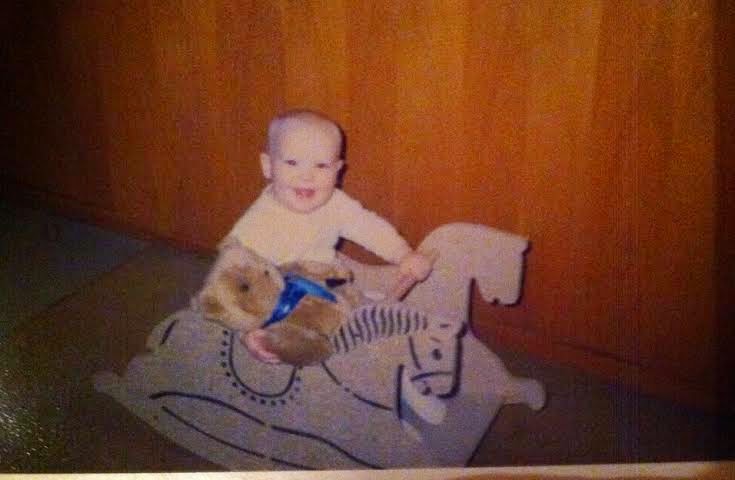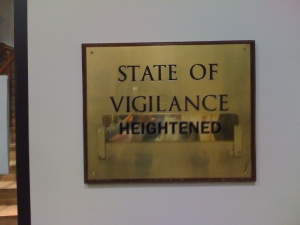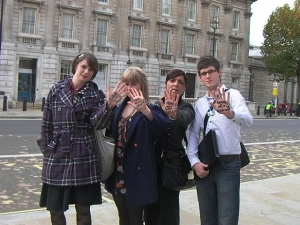30 years ago, in 1984, my family moved to West Berlin with my Royal Military Police father. As the world remembers the falling of the Berlin Wall here's a few of my own memories through the eyes of a teenager.
 |
| Me and two brothers in their matching East German outfits awaiting the birth of the smallest |
As we had when we lived in Antrim, Northern Ireland, our military ID cards were demanded everywhere we went; the military compounds, the NAAFI (Navy, Army, Air Force Institute) where we did our local shopping, our cinemas, the special army buses, swimming pools and military hospitals.
I remember having a mixture of feelings about this; on the one hand it was seen as a special (read: good) thing because we were The Military, but on the other it was rather scary, with men in uniforms and guns everywhere. Only now do I realise we may have been a target for people not wanting us to occupy their territory.
I remember having a mixture of feelings about this; on the one hand it was seen as a special (read: good) thing because we were The Military, but on the other it was rather scary, with men in uniforms and guns everywhere. Only now do I realise we may have been a target for people not wanting us to occupy their territory.
Military Bases
Each occupying force had an area of Berlin: French, American, British and Russian. Each area had their own military base and services. The street signs in each area were in both German and the occupiers language, schools operated in their native language and shops filled with familiar brands and flavours.
As we were also devout Mormons my family used to hang out in the American Sector doing All-American traditions: Halloween, Thanksgiving, Taco Bell and Burger King. Soda Floats, Reece's Pieces and Jello were available everywhere, our family had garage sales and a Big American Car.
Military School
Back in the British Sector, along with thousands of other military and diplomats children, I attended Havel School inside the grounds of RAF (Royal Air Force) Gatow. The site of a former hospital, possibly also holding prisoners, the school was austere and brutal. We were escorted in every day on the military-only buses.
 |
| Entrance to the military compound my school was located in |
As a rebellious teenager during breaks we used to sneak down to the 'Eintritt Verboten' basement to tell each other spooky stories and to generally be naughty. I vividly remember the time we wandered down a long dark tunnel following a shard of light streaming through a dusty broken window, the glass strewn all over the cold concrete floor. As we approached we saw a load of Nazi symbols daubed on the dank, grey walls, the beam of light illuminating a large Swastika. Spooked we certainly were.
 |
| War monuments at my school |
Of course we were taught about the atrocities of the Holocaust, accompanied by numerous trips to Concentration Camps, Hitlers Bunker, Torture Chambers, Museums and so on, and Our Glorious Victory against the Fascists was the version of history we had drilled into us. Here's another version: The Real History of World War Two.
In other classes we used military metaphor and played army practical jokes across all subjects. In Design, Craft and Technology class I made a, rather good, clock from acrylic in the shape of Berlin. A blue layer for the West, red for the East, both laid on top of a layer of black with a gap to depict the wall.
 |
| My brother in his kit |
In Berlin I joined the Air Training Cadets and spent most of my time learning how to iron my uniforms, performing marching drills, cleaning guns and other equipment. In the Grunewald we learnt the art of making fires, building tents from trees and other forest items, canoeing, cycling and cross-country running.
Military Privileges
As military personnel and family we were granted extended privileges, the significance which I was kind of unaware of at the time. We had access to the Olympic Stadium where my swimming club conducted training sessions and our youth club held regular disco's in the club rooms.
We were able to travel more-or-less freely from West to East Berlin, whereas most Berliners could go not go either way.
And we were given an exchange rate nine times that of non military Germans. So whereas most people got 1:1 West/East Deutsche Mark we got 9:1. This made our family's meagre military wage go nine times further, it made us rich to the extent that we were able to eat at the 5* Hotel at Alexanderplatz. I forget it's name but I do remember having flambeed fillet steak!
And we were given an exchange rate nine times that of non military Germans. So whereas most people got 1:1 West/East Deutsche Mark we got 9:1. This made our family's meagre military wage go nine times further, it made us rich to the extent that we were able to eat at the 5* Hotel at Alexanderplatz. I forget it's name but I do remember having flambeed fillet steak!
Back to our garrison home we brought back car fulls of simple but practical wooden furniture, bold and bright crockery, cuckoo clocks, nutcrackers, clothes, crystal ornaments, bedding and tableware. We did not bring back sanitary ware and batteries...
West and East
It seems like a cliche but as soon as we crossed Checkpoint Charlie it really did feel like going from full colour television to black and white. No flashing advertisements lighting up the roads and no music in the streets, no glittering monuments celebrating war and empire only soviet statues of Lenin and Stalin. Modern German and Japanese motors were replaced by old cardboard-looking Trabant cars spewing our clouds of grey smoke, making the skies look even darker, the few shops displaying even fewer products in the windows accompanied by long queues of old women waiting for their daily bread.
We did not bring back much food for we were not allowed, we were told there wasn't enough food to go around. Sanitary wares were also prohibited for the same reason. And we also did not return with batteries for we feared we would not be safe using them. Much like the deathtrap Trabants batteries were still cased in cardboard.
The feeling, real or imagined, of being a foreigner in a hostile land was not one we had experienced before. Maybe we just had our army heads on and believed the military propaganda about the evils of the Communist East?
However, my Mum and I fondly remember having a whale of a time over in East Berlin. We loved the simple clothes (Mormons always dressed in 'appropriate clothing' at all times). My brothers, as were many military kids, we dressed in matching Popova-style bright orange patterned pyjamas.
We were fascinated by the friendliness of the shop keepers, and although we didn't much speak German I remember my Mum chatting away to the women behind the market stalls.
East is West
Returning to Berlin, as I have done six times in the last ten years, there has been incredible change since the people of Germany campaigned for reunification and to bring down the wall.
Streets that were once rather gloomy in what was East Berlin are now teaming with trendy coffee shops and shopping malls. The few remnants of the east that can still be seen are probably only still there by accident. Possibly slightly by design there are fewer McDonald's and Starbucks but only time will tell how long that will be the case.
Streets that were once rather gloomy in what was East Berlin are now teaming with trendy coffee shops and shopping malls. The few remnants of the east that can still be seen are probably only still there by accident. Possibly slightly by design there are fewer McDonald's and Starbucks but only time will tell how long that will be the case.
Friends and comrades over there tell of a city, indeed a country, still divided along political lines with both sides claiming a unified Germany has not necessarily made it a better place.
For a more political analysis see Berlin: the wall that came down and walls that went up.
No doubt my friends will tell you Ich Liebe Berlin; living there with the wall up was the most educational experience I've ever had. I don't hark back to the days of a disunited country but I will fight on for a society free from oppression and inequality.
Whilst the diving wall remains in Palestine no one will be free and equal. As they say in German Der Letzte Schlag Gewinnen Wir (we will win the last battle).
(Awaiting a fab picture of my brothers in their Popova Pj's from Mum!)
For a more political analysis see Berlin: the wall that came down and walls that went up.
No doubt my friends will tell you Ich Liebe Berlin; living there with the wall up was the most educational experience I've ever had. I don't hark back to the days of a disunited country but I will fight on for a society free from oppression and inequality.
Whilst the diving wall remains in Palestine no one will be free and equal. As they say in German Der Letzte Schlag Gewinnen Wir (we will win the last battle).
(Awaiting a fab picture of my brothers in their Popova Pj's from Mum!)






